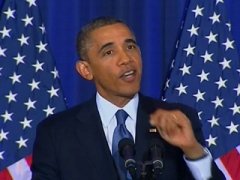Supreme Court decisions due on two Obama-related cases
As the Supreme Court heads towards the stretch run in June, two significant cases about President Barack Obama’s policies remain unsettled.
On Tuesday morning, the Court will have at least opinion to announce, along with possible new cases for its next term that were considered privately last Thursday.
The Court has already announced decisions this term about prayers at public government meetings, affirmative action programs, and financing federal political campaigns. Among the other big decisions remaining are two that relate to White House policy. Here is a rundown of the major cases:
National Labor Relations Board v. Noel Canning (heard Jan. 13, 2014)
This high-profile case asks the Court to interpret the breadth of the President Obama’s constitutional authority to make appointments during Senate recesses. The Court is considering a balance of power issue between the President and the legislative branch. The Senate’s rule change for filibusters in January changed the dynamics of the case, but it is still important test of the Recess Appointments Clause of the Constitution.
Sebelius v. Hobby Lobby Stores, Inc. and Conestoga Wood Specialties Corp. v. Sebelius (heard March 25, 2014)
The second big test in the Supreme Court over the Affordable Care Act, or Obamacare is about exceptions to Obamacare’s requirements relating to religious freedom.
In Sebelius v. Hobby Lobby Stores, Inc., the national hobby and crafts chain store asked the Court to take on the Affordable Care Act’s birth control mandate that applies to for-profit companies with religious convictions.
In the Conestoga Wood case, a Mennonite family-owned, profit-making business claims that the ACA’s birth control mandate violates the company’s rights under the First Amendment free exercise clause and the federal Religious Freedom Restoration Act.
Bond v. U.S. (heard Nov. 1, 2013)
The Bond case was heard in arguments last November, and it remains the lone high-profile case from 2013 that hasn’t been announced yet. The big picture issue in the Bond case is the possible fate of a landmark 1920 Supreme Court decision: Missouri v. Holland. The Holland decision gave Congress the power to pass laws to carry out the U.S. government’s obligations under international treaties.
McCullen v. Coakley (heard Jan. 15, 2014)
This case is about Massachusetts’s selective exclusion law – which makes it a crime for public speakers other than clinic “employees or agents . . . acting within the scope of their employment” to protest within 35 feet of a reproductive health care facility.
Hall v. Florida (heard March 3, 2014)
The Justices will determine how states define if a person is mentally disabled to the point of becoming ineligible for the death penalty.
American Broadcasting Companies v. Aereo (heard April 22, 2014)
The highly publicized case involves a copyright battle between Aereo, a tech TV startup, and the major television networks that could affect the future of broadcast television and cloud computing.
Susan B. Anthony List v. Driehaus (heard April 22, 2014)
Susan B. Anthony List v. Steven Driehaus is about the ability of two groups to challenge a controversial Ohio statute that punishes people for making false statements during political campaigns. It has drawn a lot of media attention, including a rather remarkable brief filed by humorist P.J. O’Rourke.
Riley v. California and U.S. v. Wurie (heard April 29, 2014)
Both cases examine the power of the police, acting without a search warrant in certain circumstances, to look at information stored on a cellphone taken from a suspect at the time of an arrest.
Scott Bomboy is editor-in-chief of the National Constitution Center.


No comments:
Post a Comment
Thanks for commenting. Your comments are needed for helping to improve the discussion.